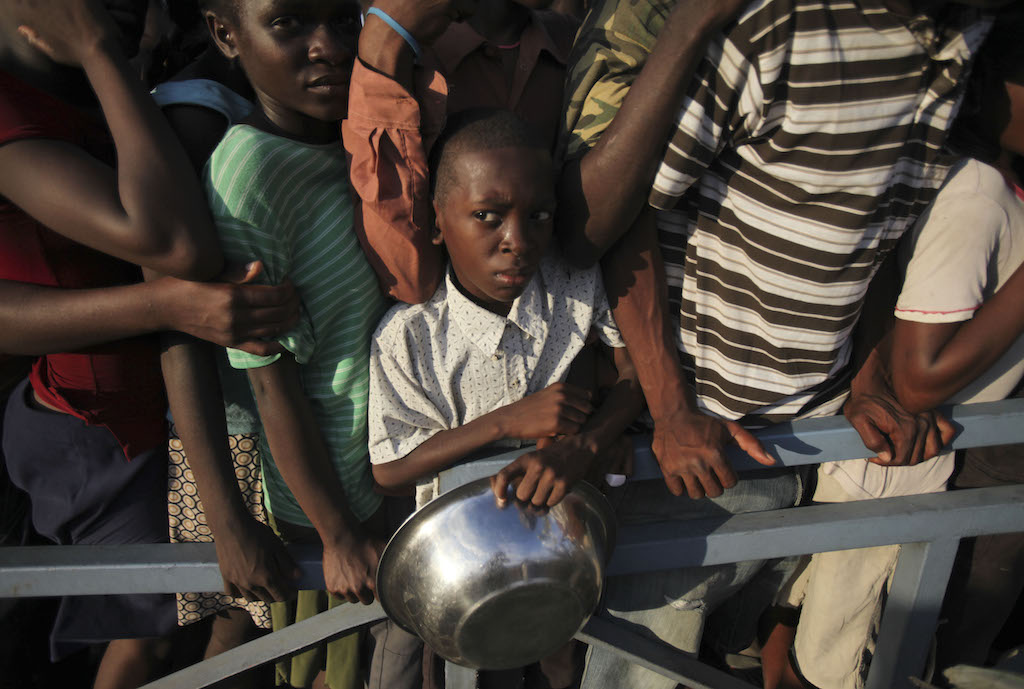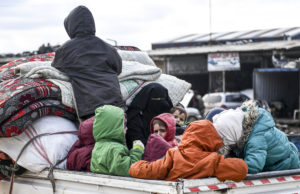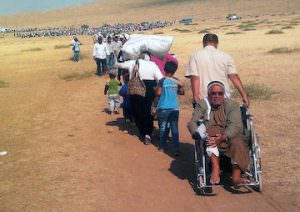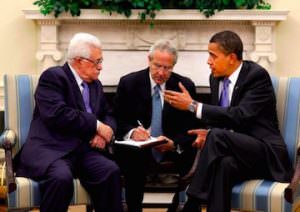Humanitarian Relief, or Charade?
The recent sexual abuse scandal involving Oxfam throws light on the potential for corruption among charitable organizations. A boy waits for food in Port-au-Prince after the 2010 Haiti earthquake. Relief groups and officials raised over $13 billion in aid, but the country received little of that money. (Ariana Cubillos / AP)
A boy waits for food in Port-au-Prince after the 2010 Haiti earthquake. Relief groups and officials raised over $13 billion in aid, but the country received little of that money. (Ariana Cubillos / AP)
The recent Oxfam sexual misconduct scandal shocked many—except for those of us who have worked with nongovernmental organizations (NGOs) and United Nations agencies. For us, this wasn’t shocking. It was simply depressingly familiar.
In the West, the media give us images of relief efforts, spinning humanitarian benevolence as personal generosity. Indeed, for the reader of these stories it is impossible to know which operations are genuine and which are fraudulent. We live in an era in which “relief” is a keyword in media, advertising and business, with many institutions catering to the politics of one relief organization or another.
For instance, domestically, there has been an upsurge of complaints by the Federal Trade Commission, which has recently charged a student loan debt relief operation with bilking more than $28 million from thousands of consumers throughout the United States. These companies had promised consumers that their monthly student loan repayments would go toward paying off their student loans, when in reality, the government charges, none of the money went toward their loan repayments.
While we have a crisis of student loan debt today—everyone from recent graduates to middle-aged individuals are desperate to get assistance—this kind of loan in the United States cannot be erased through insolvency proceedings. Thus, we have a burgeoning market for credit repair or loan consolidation, as credit repair companies tout solutions that may be attainable for free, or that come at a high cost to the consumer and can even involve lying to consumers.
Switch paradigms and people tend to be far less suspicious of relief bodies than they are of financial institutions at home. As someone who has lived and worked in the “global south”—developing or underdeveloped regions in Africa, Latin America and Asia—I have witnessed the defrauding of relief funds and the abuse of power by organizations that leached local resources while keeping NGOs afloat and hefty salaries abundant.
Working in the child protection area of responsibility for the Global Protection Cluster for six months after the 2010 earthquake in Haiti, I witnessed many relief organizations doing as little as possible to alleviate some of the well-known dangers to vulnerable children in the country. A colleague from a participating NGO accused a well-known international relief organization of “moving the furniture around” by shuffling relief workers in and out every few months, leaving projects perpetually unfinished.
One NGO offered money to tent dwellers at the edge of a displaced-persons camp to take down the tents of their competitor NGOs, whose logo was emblazoned on the sides, and replace them with their own tents. Why? So that the CNN camera crews due on site the next day could show donors that their money had gone to a justified end.
The focus of relief organizations is all about fundraising. Speak to anyone in displaced-persons camps and he or she will have dozens of stories about being offered money to perform a “task” in order to bring in more donations. For more than four decades, Haitians have known that “relief” is sheer theater. In 2010, when $10 billion in earthquake aid was promised, Haitians knew they would never see any of it. And they were correct.
Of the 1.5 million Haitian people displaced by the earthquake, 95 percent are ostensibly no longer in the displaced-persons camps, but in shoddy wood and tin constructions eight years later. The Red Cross has yet to account for $500 million, and the billions in relief aid is nowhere near accounted for. And the post-earthquake situation deteriorated so badly that as of December 2017 there have been 817,000 cases of cholera in the country, resulting in almost 10,000 deaths.
I also witnessed organizations that claimed to bring medical relief. These services actually damaged the already existent Haitian health services, which people abandoned in favor of medical NGOs offering free foreign drugs. This action flooded the market, resulting in Haitian doctors having to leave the country for lack of paid work.
Similarly, Haitian engineers were shocked to witness the flood of international engineers, flown in and given inflated salaries. One U.N. colleague, a week after arriving, was asked to sign off on a “completed” construction site. When he asked to inspect the site, his supervisor forbade him to visit it and further pressured him to sign off on the project. My colleague resigned immediately over this.
Haiti became the site of professional colonialism. Elites from countries around the world took Haitian problems in hand without consulting the national organizations or professionals.
The scene is orgiastic in excess: the donor money, the hiring of young university graduates (often Ivy League) and inflated salaries of executives to the tune of $20,000 and more per month. This includes a special add-on for hazardous pay, despite the fact that these same workers are prohibited from going into hazardous zones (as was the case in Haiti after Jan. 10, 2010). The public face of relief work speaks about the poor, the sick and the children, but everything remains discursive, floating on the surface of “goodwill” that is entirely performative in nature.
The recent Oxfam scandal duplicates the corruption and abuse replete in these organizations. The mandate of these groups is clear: Look busy, but get as little done as possible. Ensure that donor money keeps pouring in. And continue to prop up a system that ensures that international elites live in colonial style—luxurious homes with large pools on the mountain overlooking the slums of Port-au-Prince—with “third world” faces as their exotic backdrops. It’s colonialism through and through, with the cellophane wrapping of “relief aid” stamped upon it.
Graham Hancock’s “Lords of Poverty” is a scathing indictment of the betrayal of public trust and reveals the pervasive abuse of humanitarian aid. This 1989 book proved serious enough to raise questions about the market of “humanitarian relief” at all levels. Hancock’s exhaustive report uncovered the need for a critical reevaluation of humanitarian relief—from one government’s motives in giving foreign aid, to the other government’s motives for receiving it, and of the needs of the intended beneficiaries, which are overwhelmingly not met.
Not only are the needs of the intended recipients of such aid going unmet, Hancock shows how such relief funds enrich wealthy nations while continuing a theater of benevolence, as debt payments to Western countries dwarf the paltry relief given. Graham’s conclusion is that aid is a charade, justified in the name of the “needy,” whose function since the 1930s has been to create a neocolonial class of privileged elites:
In that notorious club of parasites and hangers-on made up of the United Nations, the World Bank and the bilateral agencies, it is aid—and nothing else—that has provided hundreds of thousands of “jobs for the boys” and that has permitted [a] record-breaking standard to be set in self-serving behaviour, arrogance, paternalism, moral cowardice and mendacity.
What Hancock revealed almost 30 years ago is exponentially grimmer today. And the situation with Oxfam shows that it is business as usual, with many only concerned with the “civilized” white, Western bodies. Until we understand the larger picture of neocolonial power behind the scenes, we will never come to terms with the fact that the very “relief situation” that people throw money at is entirely manmade and not a “natural disaster.”
The pillaging of the “global south” violates women’s bodies just as it destroys local economic and political structures, denying our fellow humans the dignity to say no to international predation in the name of “relief” and benevolence.
Your support is crucial...As we navigate an uncertain 2025, with a new administration questioning press freedoms, the risks are clear: our ability to report freely is under threat.
Your tax-deductible donation enables us to dig deeper, delivering fearless investigative reporting and analysis that exposes the reality beneath the headlines — without compromise.
Now is the time to take action. Stand with our courageous journalists. Donate today to protect a free press, uphold democracy and uncover the stories that need to be told.






You need to be a supporter to comment.
There are currently no responses to this article.
Be the first to respond.